We may earn commissions when you buy from links on our site. Why you can trust us.
The Best Inexpensive DIY Home Security Systems
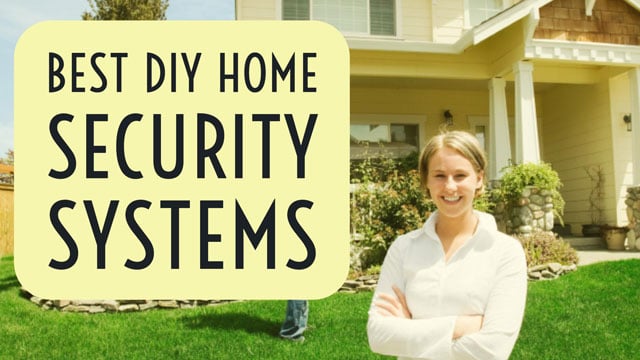
Whether you own or rent your home, a security system offers peace of mind against theft, fire and other hazards. However, monthly fees for professionally monitored security systems may be too much for your budget.
If you've shopped around and concluded that monitored systems won't work for you, you still have options. Connected home technology offers great DIY home security choices with the advantages of a traditional security system at a fraction of the cost.
Pros and cons of DIY security systems
A DIY home security system has its pros and cons. Before you commit, here's what you need to know.
- As the name implies, by going DIY, you don't get professional installation. On the flip side, these systems are usually easy to set up. They're wireless and require no special mounting hardware. Typical units need only a power outlet (or batteries) and a place to sit.
- Because you don't have to drill holes in the wall to install these systems, they're a great choice for renters. You can set them up anywhere without damage and take them with you when you go.
- There are no contracts or required monthly fees, which makes DIY systems an attractive option for keeping monthly costs down.
- You can buy as much or as little security system as you want. Most DIY systems are modular, with components like cameras, smoke detectors and door sensors. Customize your system to include only what you want. You don’t have to pay for a one-size-fits-all package with these systems.
- You may be losing out on professional monitoring if you choose a DIY system. The trade-off for no monthly fee is that no one's keeping an eye on your system except you. While some companies offer monitoring to go with DIY security systems, a monthly fee will be involved.
- Your system is only as good as your monitoring because, again, without professional monitoring, you're the one doing the monitoring. A DIY security system is designed to work with your mobile device, letting you check your system from wherever you are and sending notifications if anything's amiss. This requires a bit more attention on your part, so bear that in mind if you choose a DIY system.
Picking the perfect security system
 If a DIY system is the right option for you, the next step is deciding what kind of system to buy. If you've already been shopping around, you know there's a dizzying array of options. We narrowed down the field to the best systems for the average user, so we only considered systems that included these features.
If a DIY system is the right option for you, the next step is deciding what kind of system to buy. If you've already been shopping around, you know there's a dizzying array of options. We narrowed down the field to the best systems for the average user, so we only considered systems that included these features.
- A hub with internet access connects all the individual parts of your security setup and lets them work together. Internet access ensures you can access your system from anywhere.
- A smartphone app for remote monitoring lets you keep an eye on your home.
- Door sensors detect when doors are opened.
- Window sensors detect when windows are opened.
- Movement sensors detect when something moves within a room.
- An internet-connected camera lets you see what's happening live in your home.
- A high-decibel alarm scares off thieves and alerts neighbors of a problem.
While the above features are essential for a good system, a few additional features can make a good system even better.
- Professional monitoring adds a monthly fee, but it can give you solid system without the contract required by traditional services.
- Compatibility with other smart home gear can be a great benefit if you have a smart home set up already. If you've invested in smart home tech, look for a security system that works with it.
- Battery backup allows your system (or at least parts of it) to work without power.
Considering these features, we narrowed down the best available DIY home security systems to just four: Samsung’s SmartThings, the iSmartAlarm, the Piper NV and the Insteon. All include our must-have features, and each works with certain types of smart home systems. Which one is right for you?
Piper NV
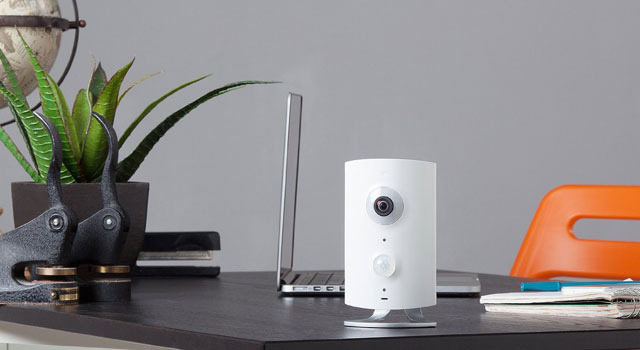
Piper's systems are as streamlined as you can get. The core of the Piper NV system is a single device that contains a camera with night vision and a 180-degree field of view, a motion detector and sensors that detect light, sound, temperature and humidity, and a 105-decibel alarm. All you have to do is set the unit on a shelf, plug it into a power source (and add batteries, in case the power goes out) and connect it to your Wi-Fi network. You're good to go.
Set up your Piper through the smartphone app for iPhone or Android, then configure simple rules for what it should do when it detects anything. You can check on the house at any time and get alerts by push messages from the app, text messages, email or phone calls.
There are two ways to add additional functionality to the Piper. The system is compatible with Z-Wave compatible home automation devices; paving the way to add a world of smart sensors and gadgets to your Piper. Expand it into a full-fledged security system with door and window sensors, or turn it into a home automation system with connected thermostats, lights and more. The Piper also supports IFTTT, giving you even more ways to connect it with other smart gadgets.
Though the Piper is more of a one-size-fits-all solution, it’s a great choice if you’re looking for simple setup, and you can still expand it with add-ons if you decide you want to.
Price: $235 from Amazon
Samsung SmartThings
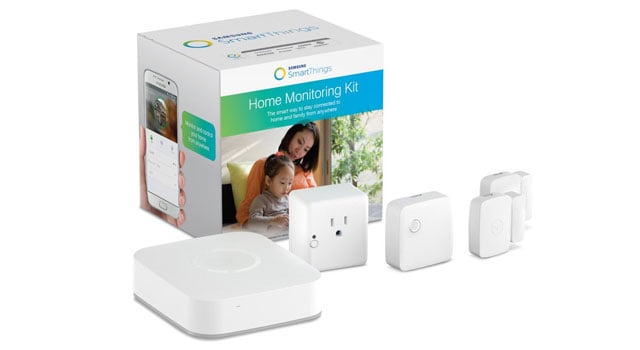
If you don't already have a smart home setup but want one, Samsung's SmartThings gives you everything you need for both a smart home and smart home security. Like other products in this category, SmartThings includes a hub that connects to other SmartThings devices including motion sensors, multipurpose sensors that can sense open doors, windows and more, smart outlets that let you to control light fixtures or electronics, arrival sensors that tell when someone in the family arrives home and water leak sensors to alert you about leaks.
The SmartThings Home Monitoring Kit ($241) is the place to start. It includes a hub, two multipurpose sensors, one motion sensor and one outlet. While you may want to add to it — both the camera ($139+) and audible alarm ($49) are extra — the kit includes all the basics.
SmartThings' strength is the number of products that work with it. It works with cameras from Samsung and D-Link, lights from Philips and Cree, locks from Yale and Quickset, thermostats from Honeywell and many more. Everything can be controlled through the SmartThings app for iPhone, Android or Windows Phone. Automate routines or configure certain things to happen when someone comes home, like turning the lights on. See what's happening at home, and control any connected device from your smartphone.
If you want professional monitoring, SmartThings is the only item on this list to offer it. A bundle that includes the Home Monitoring Kit and seven months of monitoring from Scout costs $279. After the first seven months, you pay $10 a month — a good price compared to most professionally monitored systems.
The downside to SmartThings is cost and complexity. While the number of products available gives you a great range of options, it can make it harder to figure out what you need, and everything you add adds to the price tag. However, the system’s expandability makes it an excellent choice for anyone looking to build a smart home system.
Price: $241 from Amazon; $279 with 7 months of professional monitoring from Samsung.
iSmartAlarm
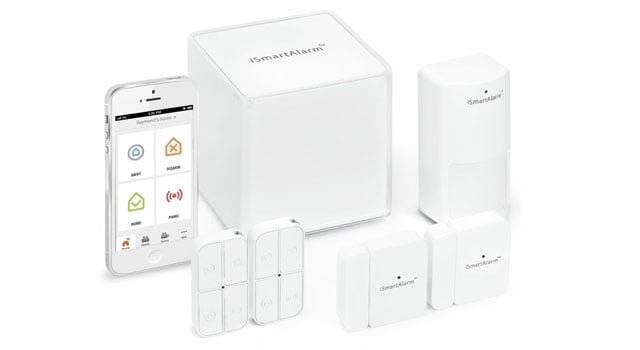
While the iSmartAlarm doesn't work with as many third-party gadgets as Samsung's SmartThings, deciding what you need with your iSmartAlarm system is a lot less daunting. It covers all of our must-have basics including an internet-enabled hub (the CubeOne), three camera options (including cameras that can tilt and pan and see in the dark), a 110-decibel alarm, motion sensors, door and window sensors, smart switches and remote tags that offer easy push-button control of the system and make it easy to track who's home and who isn't.
A variety of bundles make it easy to one-click shop without having to think too hard about which individual components you need to pick up. You can still customize by adding extra components. The companion app, available for iPhone and Android devices, lets you monitor the system live. See who's home, watch live video and see what doors are open or closed. Unfortunately, Windows Phone users will want to look elsewhere.
The Preferred Package ($178) gives you a basic setup with a CubeOne, motion sensor, two contact sensors and two remote tags. As with the SmartThings system, you'll have to add a camera ($99+) and audible alarm ($39) if you want them. If you need a package that comes with a camera, get the Preferred Video Bundle ($329), which includes a CubeOne, motion sensor, two contact sensors, two remote tags and an iCamera that offers pan and tilt as well as night vision capabilities. If neither bundle sounds like the right fit, iSmartAlarm offers several others, one of which is sure to suit your needs.
To connect to other smart home devices, iSmartAlarm uses IFTTT (if this then that), which lets you create a variety of "recipes" that tell your iSmartAlarm or other smart devices to do specific things when certain conditions are met. For example, you might turn on your Philips Hue lights when iSmartAlarm registers the door opening or arm your alarm system when your phone is detected leaving the house. Setup is simple. Connect your smart devices to IFTTT, and then select preconfigured recipes or build your own custom recipes to make things work just the way you want.
Price: Preferred Package $178 from Amazon; Preferred Video Bundle $329 from iSmartAlarm
Insteon
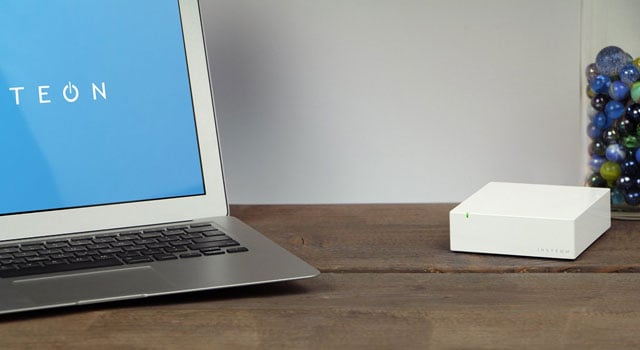
Another modular system, Insteon, lets you pick a hub (either the basic Insteon Hub or the HomeKit-enabled Insteon Hub Pro) and then add the devices you want. Choose from cameras, sensors, door locks, smart outlets, thermostats (including the popular Nest), lights and plenty more. Your system can be as simple or as complex as you'd like. As with the rest of the systems on this list, you can monitor and control everything through your iPhone or Android smartphone.
Insteon's stand-out feature is compatibility with Apple's HomeKit and Amazon's Alexa, which lets you control your system by voice control through Siri or Alexa, respectively. The basic hub is an affordable $69, although to get Siri support and compatibility with other HomeKit devices, you'll need the pricier HomeKit Hub for $149. While the price is great, remember that you'll have to add extra pieces to get a complete system. Depending on what you need, you could end up spending more or less on the Insteon than other systems.
If HomeKit and Siri compatibility are top of your must-have list, Insteon is the way to go. Amazon fans will get good use out of Insteon, too, if they own any Alexa devices like the Echo.
Price: Insteon starter kit $99 from Amazon; HomeKit-enabled Insteon Hub $149 from SmartHome
Updated on 8/17/2016 with new product picks.
[Image credits: iStockPhoto, Piper, Samsung, iSmartAlarm, Insteon]
Discussion 
Hi there, You’ve done an excellent job. I’ll certainly digg it and personally recommend
to my friends. I am confident they’ll be benefited from this web site.
Good suggestions for inexpensive security systems. Excepting the battery backup problem iSmart alarm is a good choice. The night vision and tilting will provide a good vision. Reliance home security monitoring systems ( http://cspalarms.ca/cctvsecuritycameras/ )
provide CCTV security cameras with tilt/pan cameras with more features and it overcomes the problem of battery backup too.
I’ve looked into Piper and Canary and because they have everything packed into 1 unit, they’re more suitable for apartments. I have a house on the outskirts so I need something to cover a larger area and buying multiple devices isn’t practical. Simplisafe seems to be a better option. I’ve also come across a new DIY company Armorax and they do video monitoring, something Simplisafe lacks.
After i buy a SIMS card. I was wondering how much data is used each month. When monitoring with my cell phone.I assume the only thing used is Data. no voice.
I have the KEO system, it’s a smart home system that was so easy to install, there is an app for your phone so I can control the lights, thermostat and lock/unlock the front door from my driveway.
The best part is that I can take the system with me when I move.
http://www.mykeo247/jhodgkin
A lot of consumers are still not aware of the Helix, which at it’s debut at CES2014 won the TechHome Mark of Excellence award. We offer Helix with SmartLink app as a DIY/Self-Install security option with robust Connected Home abilities on our site sandiegosecurityandfire.com Free shipping, 30-day guarantee, and a lifetime of service equipment warranty.
I didn’t know that there were DIY home alarm system options but from what I see here they make a lot of sense. I’ll look into building my own system since it seems like it would have its own advantages in break-in prevention to create a self-contained home security solution. Although I can see a lot of benefits to a corporate system, I’ll be checking into both options to see which is the most reliable for my home.
After living with some questionable roommates I’ve looked into a DIY security solution. I like that you’ve not only listed the top security cameras and their reviews but videos showing their use as well. Depending on my need I may end up going with a security company but I will keep these options in mind as I continue my research.
I’m not tech savvy at all, and that was the hook for me in purchasing the iSmartAlarm system - it’s extremely easy to setup and operate.
We added one of their new cameras to our system and it’s one of my most frequently used Apps.
Do yourselves a favor and find out why this DIY system has been endorsed by the National Sheriff’s Association https://get-dragonfly.com/A6A422/ and how it aides in catching the bad guys by verifying a crime in progress. Call your local police and ask them if they respond to an alarm as a priority 1 if one of your alarm sensors has been triggered and you’ll find out that only applies if someone is verifying an actual crime in progress. Most people don’t realize that traditional alarm systems generate a priority 3 response because 98% of alarms are false which in turn leads to a pathetic .08% apprehension rate because the police are slow to respond knowing its most likely a waste of resources. Insurance companies know this and account for it in premiums. Hopefully people will begin to understand this and in turn the industry will change course when we purchase proper verified systems. Buy home automation systems for home automation and for security alarm systems buy motion viewers.
Also the motion viewer system I mentioned has been used commercially around the world for the past ten years with over a million installed. With apprehension rates hundreds of times higher than traditional systems, and as high as 80% depending on implementation. The system has just been updated and released as a DIY with user friendly app. Also one other tidbit, on average 17 crimes are prevented with each apprehension. So help in catching the bad guys with motion viewers
Hello, I am going into the alarm installation business. My partner is an electrician. You do not mention how this product is installed. Is an electrician needed? Can the system be programed to call whatever numbers we program into the system? If so would you be will to discount the product if we buy in bulk?
All of these systems are meant for easy DIY installation and do not require an electrician. The various components either plug into the wall or run on rechargeable/replaceable batteries.
Number programming varies by system. Some, like the Panasonic will dial out to the number you choose. Others either dial in to a central service or send alerts via text message.
You would have to contact the individual companies about bulk discounts. We don’t sell these products directly, just provide links for where you can buy.
There is no mention of bulk pricing because this site is simply an affiliate site. All comments are monitored…to delete any poor reviews. Further, anytime you click on anything listed (note: they are only Amazon products) the affiliate receives a percentage of your purchases. See the disclaimer in the bottom.
“Techlicious participates in affiliate programs, including the Amazon Services LLC Associates Program, which provide a small commission from some, but not all, of the “click-thru to buy” links contained in our articles. These click-thru links are determined after the article has been written, based on price and product availability — the commissions do not impact our choice of recommended product, nor the price you pay. When you use these links, you help support our ongoing editorial mission to provide you with the best product recommendations.”
Have you come across people that are interested in DIY but feel the notification burdens are perhaps too onerous for them? Like you say, since you are the one doing the monitoring, it’s only as good as when you are paying attention and ability to respond.
Personally, I think it’s a big gap - say you are away from your home and you are notified of an event, by the time you get fiends, family or even police mobilized, its likely too late. IFTTT can solve this somewhat by having a tweet for instance sent every time motion is detected. But I find sharing say videos of breaches in your home are difficult.
(Disclosure - I’ve developed an app solution that might address this but I’m still in verification phase on demand for such a feature to address this).
There are apps that let you remote monitor your security system? This would really be ideal for me since I am gone from my house for most of the day. I will look into some systems that have this feature. Thanks!
I am surprised that GetADragonFly.com isn’t on your list. They meet all the criteria on the “picking the perfect security system” bullet point list. Additionally, the DragonFly system utilizes video-verified technology which sends live video directly to dispatchers. I highly recommend this system!
Helpful review, but all these systems are vulnerable to DSL line cutting or cable line cutting (often a little more hidden).
Would be interested in a review of 4G mobile connected systems. Unfortunately this whole segment has been corrupted by bogus reviews on Amazon so good objective info would be helpful.
For a cellular backup, you’ll be paying a monthly fee for service. If that’s something you’re interested in, you can get that using the Samsung SmartThings system and Scout’s monitoring service for a $9.99 per month (no contract). Scout’s service has a backup cellular connection. You can find out more here: https://www.scoutalarm.com/shop/monitoring-plans
I want to introduce diy or wireless home security system in Botswana and later go to the rest of Africa, but it has been months now trying to get hold of companies which can supply me with diy systems.If they is anyone here interested with working with me please contact me through my email address orionflarebotswana@gmail.com, I welcome any suggestions on how to go with it.
Looking for DIY security system that will allow me to put in my OWN SIM card. I am looking to receive push notifications (e.g. Text, email) through my home network and Internet connection; however, iof the home Network and Internet connection is down (the bad gut cuts the wire outside the house), I want the mobile phone in the unit to call me or send me a text or may be even an email [not through the Internet connection. This’s why I want to install my own SIM card that will cost me $5.00 per month say from a T-Mobile reseller. This way I don’t have to have a monitoring service. Ideally I can program up a bunch of family members email addresses and phone numbers and they will all get notified. Having 5 family memebers or friends notified is much much much better that an central station monitoring and it costs ZERO.
There are systems out there tat let you use your own SIM card for cellular alerts. Fortress Security is one of them (disclosure: Fortress is a paid sponsor). You can learn more about their offering here: https://www.techlicious.com/blog/inexpensive-security-for-home-business/
My wife and I have been thinking about installing a home security system but we aren’t sure where to start. I like that you mention how not having professional installation means the only person monitoring the systems is you. We’ve never had to do something like this so I think having a professional help us would be our best option. Thanks for sharing!
Another company to look at is Armorax. They always have amazing deals going on where they give out free cameras and what not. My monitoring rate with them is super reasonable given that I got the video and home automation features as well. They’re definitely worth looking into!
Despite all of the bad reviews I read online, I went to my local Menards and bought the Insteon Hub2, an indoor 360 degree WiFi camera, and a door/window sensor - about $215 in total. I thought maybe the reviews were skewed by less-than-technical people, but found out very quickly that they were in fact not. I returned the system to Menards and received an instant refund. The clerk said these products get returned all of the time and all for the same reasons. There’s too many cons to list here so just go to Amazon to see why this vendor should be avoided at all costs.
In the USA you have SIMPLY SAFE DIY alarm system with camera options, and wireless, at very reasonable prices . What is comparable and available in Ontario Canada
Thanks,
Garry
Looking for a home security that will monitor the out side of my house and yard especially the carport as we had two cars stolen last night in the area








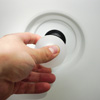






From Victoria Runda on July 16, 2015 :: 9:53 am
I will probably look more into iSmartAlarm and see what functionality it really offers. I would like to build up at least a small monitoring system until I can afford a more traditional security system. I figure that in the meantime that I should still do whatever is possible to secure my family and our possessions.
Reply